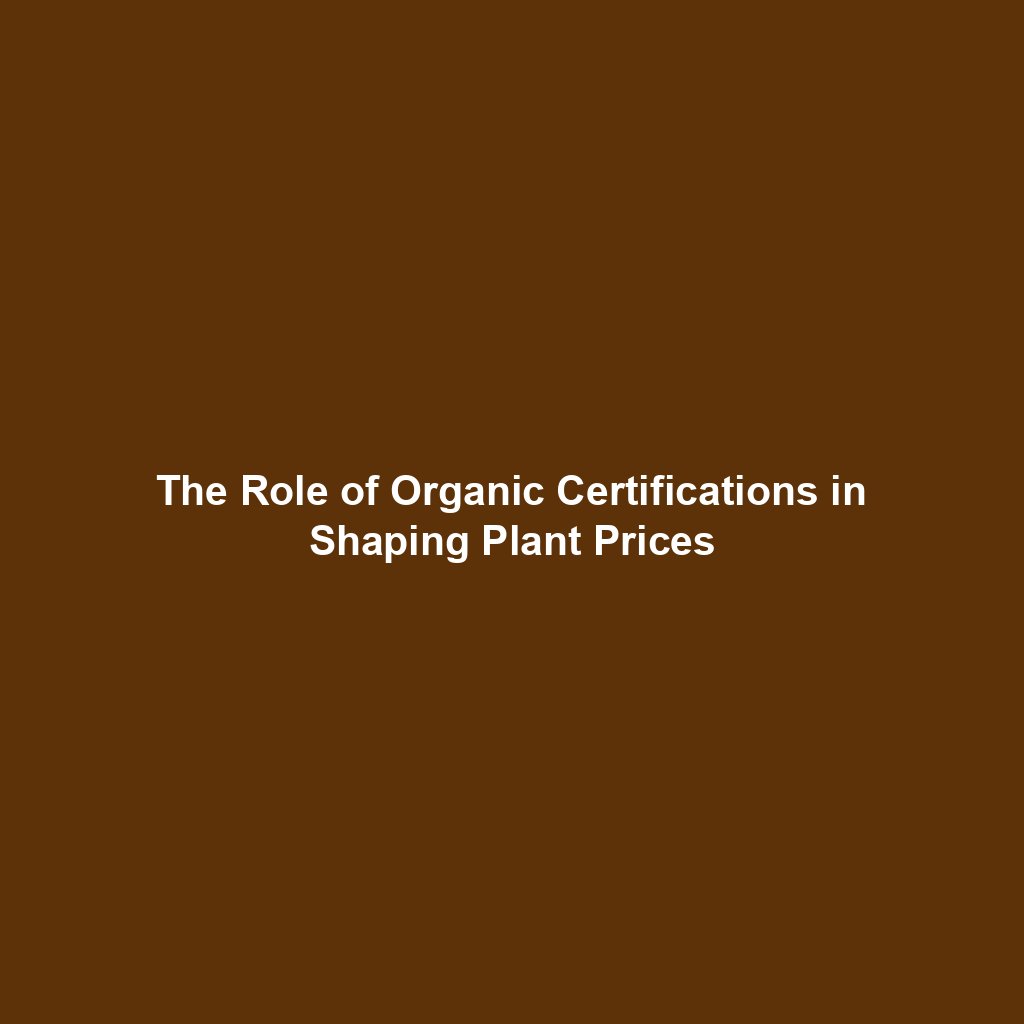
Introduction
Agriculture has always been a cornerstone of human civilization, providing the essential resources needed for survival and economic development. In recent years, the focus on sustainable and organic farming practices has gained significant momentum. This shift has not only impacted farming techniques but also influenced the pricing dynamics of agricultural products. Organic certifications, in particular, play a crucial role in shaping plant prices, affecting both producers and consumers. This article delves into the intricate relationship between organic certifications and plant prices, exploring the various factors that contribute to this dynamic.
The Importance of Organic Certifications
Understanding Organic Certifications
Organic certifications are formal recognitions provided by authorized bodies to farms and producers that adhere to specific organic farming standards. These standards typically include the avoidance of synthetic pesticides and fertilizers, the use of organic seeds, and the implementation of sustainable farming practices. The certification process involves rigorous inspections and compliance checks to ensure that the products meet the established criteria.
Consumer Trust and Market Demand
One of the primary reasons organic certifications are vital is the trust they instill in consumers. With growing awareness about the health and environmental benefits of organic products, consumers are increasingly willing to pay a premium for certified organic plants. This heightened demand directly influences plant prices, creating a distinct market segment for organic products.
Market Access and Export Opportunities
Organic certifications also open doors to new markets and export opportunities. Many countries have stringent regulations regarding the import of agricultural products, and organic certifications can serve as a passport for entry into these markets. This expanded market access can lead to higher prices for certified organic plants, benefiting producers who invest in organic farming practices.
Factors Influencing Plant Prices
Production Costs
The cost of producing organic plants is generally higher than that of conventional plants. Organic farming practices often require more labor-intensive methods, such as manual weeding and pest control. Additionally, organic fertilizers and seeds can be more expensive than their synthetic counterparts. These increased production costs are typically passed on to consumers, resulting in higher prices for organic plants.
Supply and Demand Dynamics
The basic economic principle of supply and demand plays a significant role in determining plant prices. The supply of organic plants is often limited due to the stringent requirements and higher costs associated with organic farming. On the other hand, the demand for organic products continues to rise as consumers become more health-conscious and environmentally aware. This imbalance between supply and demand contributes to the higher prices of organic plants.
Certification Costs
Obtaining and maintaining organic certification involves various costs, including application fees, inspection fees, and compliance costs. These expenses can be substantial, especially for small-scale farmers. To cover these costs, producers may need to charge higher prices for their certified organic plants. However, the premium prices can also provide a financial incentive for farmers to pursue organic certification.
Economic Implications for Producers and Consumers
Benefits for Producers
For producers, organic certifications can offer several economic benefits. The ability to charge premium prices for certified organic plants can lead to higher profit margins. Additionally, organic farming practices can enhance soil health and biodiversity, potentially leading to more sustainable and resilient agricultural systems in the long run. The increased market access and export opportunities associated with organic certifications can also provide a competitive advantage for producers.
Challenges for Producers
Despite the potential benefits, there are also challenges associated with organic certifications. The higher production and certification costs can be a barrier for small-scale farmers. Additionally, the transition to organic farming practices can be time-consuming and require significant changes to existing farming systems. Producers must carefully weigh the potential benefits against the costs and challenges to determine if pursuing organic certification is a viable option.
Impact on Consumers
For consumers, the higher prices of certified organic plants can be a deterrent, especially for those with limited budgets. However, many consumers are willing to pay a premium for organic products due to the perceived health and environmental benefits. The availability of certified organic plants can also provide consumers with more choices and the assurance that the products meet specific standards.
Case Studies and Real-World Examples
Case Study: Organic Vegetable Farming in California
California is a leading state in organic vegetable farming, with a significant number of farms obtaining organic certifications. The state’s favorable climate and strong market demand for organic products have contributed to the growth of the organic farming sector. A study conducted by the University of California found that organic vegetable farms in the state were able to charge higher prices for their products, leading to increased profitability. The study also highlighted the importance of organic certifications in gaining access to premium markets and export opportunities.
Case Study: Organic Coffee Production in Latin America
Latin America is a major producer of organic coffee, with countries like Colombia, Peru, and Mexico leading the way. Organic coffee producers in these countries have benefited from the growing global demand for organic products. The Fair Trade and organic certifications have enabled producers to charge premium prices for their coffee, resulting in higher incomes and improved livelihoods. The certifications have also facilitated access to international markets, further boosting the economic prospects of organic coffee producers.
Future Trends and Considerations
Technological Advancements
Advancements in technology are likely to play a significant role in the future of organic farming and certifications. Innovations such as precision agriculture, remote sensing, and blockchain technology can enhance the efficiency and transparency of organic farming practices. These technologies can also streamline the certification process, reducing costs and making it more accessible for farmers.
Policy and Regulatory Developments
Government policies and regulations will continue to shape the landscape of organic farming and certifications. Supportive policies, such as subsidies for organic farming practices and incentives for obtaining certifications, can encourage more farmers to adopt organic methods. On the other hand, stringent regulations and compliance requirements can pose challenges for producers. It is essential for policymakers to strike a balance between promoting organic farming and ensuring the integrity of organic certifications.
Consumer Education and Awareness
Consumer education and awareness will play a crucial role in the future of organic certifications and plant prices. As consumers become more informed about the benefits of organic products, the demand for certified organic plants is likely to increase. Educational campaigns and labeling initiatives can help consumers make informed choices and drive the growth of the organic market.
Conclusion
Organic certifications play a pivotal role in shaping plant prices, influencing both producers and consumers. The trust and market demand generated by organic certifications can lead to higher prices for certified organic plants, benefiting producers who invest in organic farming practices. However, the higher production and certification costs can pose challenges, particularly for small-scale farmers. The future of organic certifications and plant prices will be shaped by technological advancements, policy developments, and consumer education. By understanding the complex dynamics of organic certifications and plant prices, stakeholders can make informed decisions and contribute to the growth of sustainable and organic agriculture.



